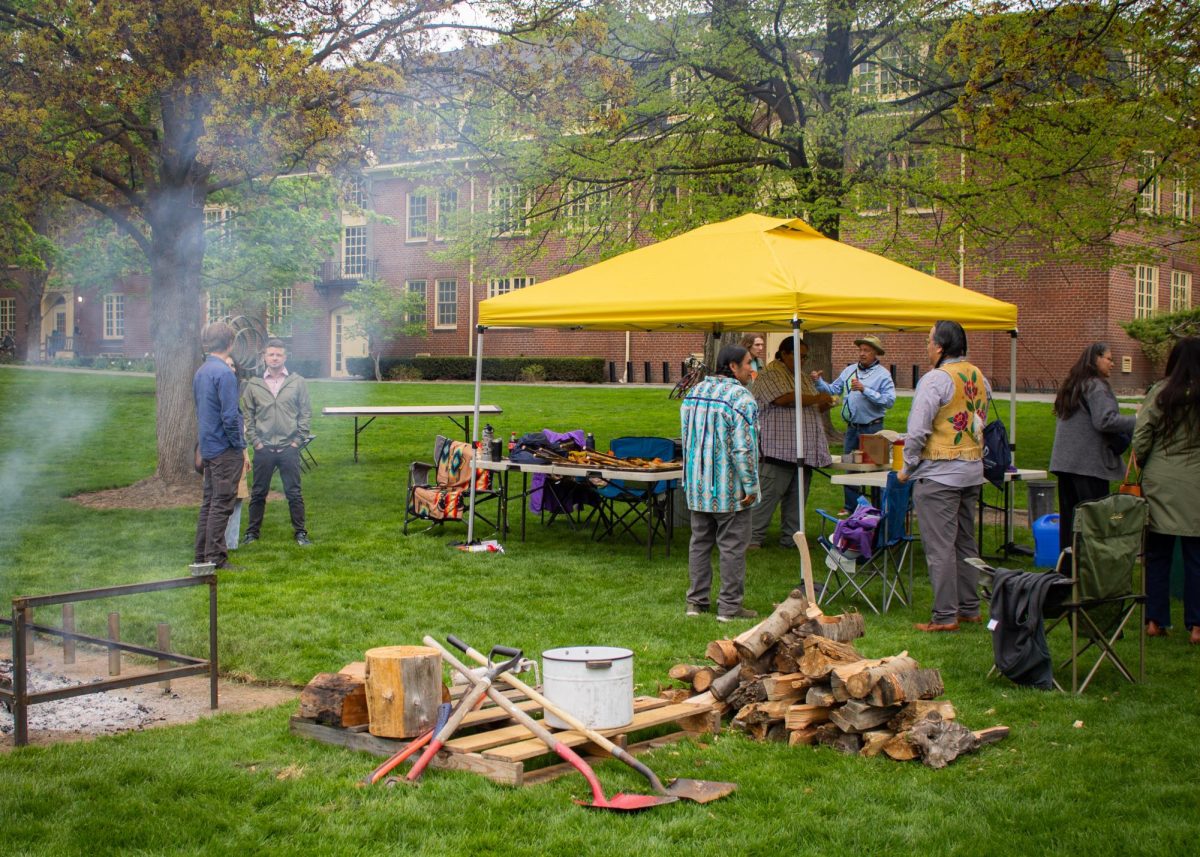
This story is part 1 in a two-part series examining incidences of sexual assault and how they are handled at Whitman and by colleges nationwide.
As the federal government continues its crackdown on sexual assault on college campuses for the third year, colleges across the country are scrambling to interpret and implement recommendations from The White House Task Force to Protect Students from Sexual Assault and other federal regulators, such as the Office of Civil Rights.
Whitman began adjusting its student sexual misconduct judicial processes almost a year ago when it unveiled a new sexual misconduct response process in fall 2013. Last spring, a student complainant put it to use for the first time.
Under Title IX, when a school knows of possible sexual violence, it is required by law to take immediate and appropriate steps to investigate or otherwise determine what occurred.
In some respects, the college’s policy toward sexual assault has not changed; incidents of sexual misconduct, harassment and assault are still defined and dealt with the same way under the new policy. However, the process for responding to and investigating reports of sexual misconduct, including assault and rape, has changed significantly.
Instead of making survivors of sexual assault prepare statements, witnesses and questions to cross examine their attackers, the college has moved to an investigative model. In this model, Whitman provides a trained investigator from the college’s staff and faculty to gather information about the incident with the help of the Title IX administrator. The evidence is weighed with a new preponderance of evidence standard. Instead of standards of evidence typical to a criminal proceeding like “beyond a reasonable doubt” or “clear and convincing,” the investigator and the Title IX administrator decide together if a violation of the school’s policy is likely to have occurred. If the respondent is found responsible, the case is then forwarded to a grievance council composed of two faculty, two staff members and two students for sanctioning.
Analysis of national statistics suggests that in all likelihood, dozens of cases of sexual misconduct occur at Whitman College each year. Only a relative few of those cases are brought before the administration. While at least one sexual misconduct case in the past year resulted in the expulsion of a student, some survivors of sexual assault on campus assert that Whitman’s new process has failed to handle their cases with sensitivity and fairness.
The First Report
Junior Alexa*was sexually assaulted during her first year at Whitman by her tutor and was reluctant to report because her attacker was an acquaintance.
“Acquaintance rape or date rape … is very hard to accept in many ways because you trust this person, you were friends with this person,” she said.
According to the Rape, Abuse and Incest National Network (RAINN), two-thirds of rapes are committed by someone known to the victim.
“I was in denial for a long time,” said Alexa. “I was not able to admit to myself that I had been unable to protect and defend myself against his advances, and that was a very shameful thing for me, especially as a self-proclaimed feminist. I worked at a domestic and sexual violence crisis center all through high school so I knew all the signs, and yet, I was in denial.”
Alexa initially felt she did not have enough evidence to come forward because she took a shower right after the incident, which washed away DNA and any other evidence and would have made a rape kit inconclusive.
Coming forward to the school as opposed to the police meant that Alexa did not necessarily need a rape kit for them to investigate her case.
“My primary goal was to get him off campus, get him to where I didn’t have to see him all the time,” she said. “And I felt like that goal could be more reasonably achieved going through the Whitman College Title IX sexual misconduct process.”
Alexa off-handedly mentioned the assault to a mandated reporter, who suggested that she report the assault to Clare Carson, Whitman’s Title IX administrator at the time. Alexa reports being told that she was the first person to try out this new process.
“I was unaware of the new process, which I think is a common problem for Whitman students and anyone associated with Whitman,” she said. “There is just not a lot of information about the new system; it was not communicated despite the fact that I still lived in residence halls.”
As the first person to go through the new process, Alexa had no peers to look to for advice or with which to compare her own experience. Part of her initial hesitation to report had been because she had heard negative comments regarding the old process.
“I believe the school has a responsibility to provide much more access to their resources through handouts, brochures and especially during the orientation weeks before school starts, as well as throughout the rest of the year,” she said.
The investigation was completed within 40 days and according to Alexa, her attacker was the first person to be expelled from Whitman for sexual misconduct in 28 years.
With her case, Alexa feels the administration tried to set a strong precedent for dealing with cases of sexual assault.
“While I would like to see [sexual assault] taken very seriously, because, honestly, these people don’t deserve a Whitman education, [they] don’t deserve a Whitman degree if they commit that kind of crime … there are a lot of factors that go into [this kind of decision],” she said.
Since his expulsion, Alexa’s attacker has gone on to enroll in a different college, but the harm he inflicted continues to affect Alexa. She struggles continuously with post-traumatic stress disorder (PTSD), so much so that she has sought treatment at a facility in Seattle, a full four hours away from Whitman’s campus. She commutes weekly, spending hundreds of dollars in an effort to find ways to cope with her trauma.
“It’s kind of a slap in the face to see him moving on with his life with his reputation intact, not having to deal with triggers every day,” said Alexa. “The justice I got from this experience in no way cancels out the struggles I face every day and will probably have to face for the rest of my life.”

More Reports Under the New Process
Since Alexa’s case, more students have gone through the new sexual assault reporting process, with varying results.
Natalie* and Mallory* reported sexual assaults they had experienced on campus shortly after Alexa’s investigation concluded, just before Spring Break of 2014. Their results came out in mid-April.
Natalie was in a relationship with her attacker who sexually assaulted her multiple times throughout their relationship, including the night where they had met at a party.
Natalie was initially hesitant to bring her claims to the college. During her first year at Whitman, she had attempted to report an unrelated incident to Carson but was unhappy with her experience. She was eventually inspired to report her assault by the expulsion of Alexa’s attacker and by the new preponderance of evidence standard. Natalie hoped her report would yield a similar outcome.
For her investigation, Natalie was interviewed by a college Title IX investigator and submitted evidence of Facebook and text messages where the respondent admitted to having attacked her while she was blacked out. She also submitted a monologue that she wrote for Breaking Ground, which she later discovered was not admitted as evidence.
After Spring Break, the investigator interviewed the respondent, as well as several witnesses: one that saw her the morning after the first attack and another that had provided her with emergency contraception.
After a separate discussion with Whitman’s Sexual Assault Prevention Coordinator Barbara Maxwell, Natalie realized that in her first interview, the burden of proof had been placed entirely on her. She had been expected to prove that her attacker knew he had raped her, regardless of his intent. Natalie felt that the investigator had asked questions that did not allow her to meet that expectation.
“It felt like I had to prove that he was doing this maliciously, like he had the intent of hurting me,” said Natalie. “It was like if [the assault] happened, but he didn’t know that it was wrong then he was not responsible … I’m sure that no rapist thinks that they are a rapist. I’m sure that they tell themselves that their victims were OK with it or that somehow they were in the right.”
However, during the second interview, Natalie felt that the investigator avoided asking about the details of her abusive relationship, instead focusing on her behavior after the first assault. Natalie also reports that she was asked what she had been wearing and why she had continued to be romantically involved with her attacker.
“She asked questions like, ‘Why did you tell him [later] that it was OK and not to worry about it?'” said Natalie. “I felt like she didn’t know that the first thing you want to do after something like this happens is to protect yourself. I wasn’t ready to admit to myself that I had been raped, much less to anyone else [and] especially not him. It felt like she [was] really blaming the victim.”
Natalie’s investigator also solely focused on the first assault, though there were multiple attacks.
“I felt blamed the entire time. I never felt that they thought the rape was my rapist’s fault,” she said.
This combination of events caused Natalie to become concerned about how her investigation was being conducted.
Ultimately, Natalie’s attacker was found not responsible for violating any school policy by the Title IX investigator and by Carson. Because her case ended at the investigatory level and did not make it to the grievance council, Natalie was denied the ability to appeal the decision made by her investigator and Carson.
Immediately after her case was dropped, Natalie brought forth complaints about what she perceived to be the poor quality of her investigation. Natalie filed a complaint with Dean of Students Chuck Cleveland who forwarded a formal complaint to independent attorney Saundra Schuster. While Schuster reviewed the College’s process, she did not evaluate Natalie’s individual case. On her own, Natalie contacted the national Office of Civil Rights.
Though the new preponderance of evidence standard had initially encouraged her to report, the end decision made by Carson and her investigator left Natalie doubting whether that standard of evidence was actually utilized.
“I think [preponderance of evidence is] a nice idea, but I don’t know if it worked out [positively] in my case. I gave them a lot of evidence –– one of which was my rapist self-incriminating [himself] over Facebook –– so it’s a nice idea, but I don’t know if they actually stick to it,” she said.
After her meeting with Schuster, Natalie filed a list of grievances, at the prompting of Schuster, against her investigator and Carson, with Whitman’s Human Resources department. Her grievances were based on claims that her investigators did not include instrumental evidence in her case and had intimidated her into not reporting. Natalie also filed a claim against her attacker for retaliation harassment. While Whitman’s HR department investigated Natalie’s claims, they ultimately decided not to take internal action.
The end report from Schuster also yielded no change for Natalie’s case. Natalie attests that Schuster was forced to write an incomplete report because Whitman had not given Schuster a comprehensive version of the case. Natalie alleges that both Schuster and Whitman administrators told her that Schuster received a truncated report and was told not to review certain items that were vital to assessing her claims against the College. While Natalie saw the official report of her case, she did not see the file given to Schuster.
“I’m appalled … I think it’s hubris that the school thinks that their policy is beyond reproach,” said Natalie.
Natalie’s attacker continues to be in classes with her. If Natalie does not want to be in classes with him, she either has to drop the course or take an independent study.
“The stuff with [my attacker] –– first the rape and then the harassment –– is the second and third time that this college has not taken me seriously … [The college has] tried to make me feel crazy for saying that these males were fucking up my life and then asking [that they] do anything about it,” she said.
Natalie is still waiting to hear back from the Office of Civil Rights about her case.
A Similar Situation
Mallory had a similar experience with an attack that happened a little over a year ago.
She and her attacker were friends, both possibly interested in a relationship.
However, after she drank to what she estimated to be an approximate 0.2 BAC, her attacker coaxed her to his room where she blacked out, only to come to consciousness while he was forcing her to have sex with him.
Mallory said she felt good about her investigation as it progressed but became frustrated when she began to be questioned about her actions toward the respondent preceding the attack. They were friends, they hung out and texted frequently about meeting up, specifically on the night that the incident occurred –– all of which was brought up by her investigator and questioned.
Ultimately, the respondent in Mallory’s case was found not responsible by the Title IX investigator and Carson. Like Natalie, Mallory’s case never reached the Grievance Council, so she had no means to appeal the decision.
“I think … the most upsetting thing [for me], sitting in that meeting room, was their reasons [for not finding him responsible],” she said.
Mallory reported being told that because she had been texting the respondent before the incident, regardless of whether she was intoxicated or incapacitated, that could have indicated to the respondent that she was interested in sex.
The investigator and Carson concluded that there lacked evidence to point to sexual misconduct, specifically noting the lack of witness testimony, as the incident occurred in a dorm room.
Mallory attests that she had bruises and bled, but that was not taken into account because there was no one else in the room to confirm that.
“The fact that you cannot rely on an institution to protect you when they put up this front of this drastic change is just so messed up,” she said.
Clare Carson retired from Whitman at the end of the 2013-14 school year. Former head of the Academic Resources Center Juli Dunn has taken her place as Title IX administrator. Dunn has been at Whitman College for 22 years with 16 years as a faculty member and two terms as a panelist. She has served as an advisor for complainants and as an Title IX investigator.
“I’ve served in every bit of this process, and I can tell you that where we are now is so much better. [This is] not to say that it is not tough, that it is not a difficult process,” said Dunn. “I think [the new process] is way better than what we had. Are there ways that we still can improve? Absolutely.”
*Names have been changed to protect the identities of survivors.
**The cases mentioned in this article took place during the 2014 spring semester. At that time, Clare Carson was the Title IX administrator; she has since retired. Associate Dean of Students Juli Dunn has taken her place starting this fall.
Next week, Part II will cover details of Whitman’s policies and the national situation surrounding Title IX and sexual assault on college campuses.





















Kara • Mar 26, 2017 at 3:55 pm
Dr Julian Abel Constantine Gojer of Toronto Convicted of Drugging and raping two woman and killing a third one with the drugs he used to render his victims unconscious before raping them. Date fall of 2000. Psychiatrist gets off with a slap on the wrist and works as a psychiatrist regardless of criminal negligence against him.
"Natalie" • Sep 25, 2014 at 11:07 am
“Natalie,” here.
For those curious what incident this excerpt “Natalie was initially hesitant to bring her claims to the college. During her first year at Whitman, she had attempted to report an unrelated incident to Carson but was unhappy with her experience” references, the details that did not get published are that my freshman year, a male student became obsessed with me to the point that he would follow me to my dorm (after I moved out of the one he lived in) and became very angry at me when I rejected his advances. The next time I saw him, he told me he was writing a book, and he was trying to figure out a way for me to die in it. I reported this to my RA, who encouraged me to report it to Clare Carson, which I did. After having, inexplicably, to JUSTIFY why I was so upset, Clare agreed to give me a no-contact order with the student in question and told me to let her know if he violated it. He did. I reported it to Clare. She told me there was nothing left to do. It’s lucky that the student left the school of his own accord after that year because the administration didn’t seem to think it was important to protect me from a student who was, at best, fantasizing about my death, and, at worst, plotting it. Given that incident, I guess I shouldn’t have been too surprised about the way my rape case was handled and concluded.